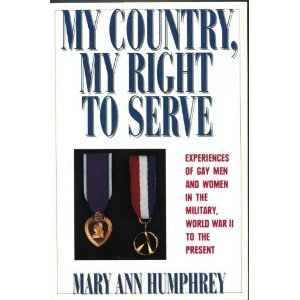The GLBTRT has been reviewing books and movies in its newsletter since the early 1990s. Trace the evolution of queer publishing through these historic reviews. This review was originally published in Vol. 3, No 3 & 4 Spring/Summer 1991.Â
 Mary Ann Humphrey. My Country, My Right to Serve: Experiences of Gay Men and Women In the Military, World War II to the Present. Harper Collins, 1990. $19.95 (ISBN 0-06-016446-8).
Mary Ann Humphrey. My Country, My Right to Serve: Experiences of Gay Men and Women In the Military, World War II to the Present. Harper Collins, 1990. $19.95 (ISBN 0-06-016446-8).
This book arose out of Ms. Humphrey’s need to cope with the humiliation she endured during the interrogation and administrative procedures established by the Army Reserve, when she was accused of ”being a practicing homosexual.”
In the author’s own words: “The stories contained in this book are the experiences of the gay man or woman who either has served honorably and not been discovered, or has been ousted from the military.” These first hand oral histories come from interviews with 28 men and 14 women, who earned various levels of rank within the Air Force, Army, Marine Corps, Navy and the National Guard.
There were many passages where I could almost hear the voices of the various friends and foes who are part of each person’s story. Folks were thrown out for “practicing homosexuality,” but no one was ever tossed out for their heterosexuality, even when they too were caught while engaged in sex. About one third make comparisons to Truman’s executive order of 1948, forcing the integration of blacks within all ranks of the Armed Forces, as something that gays and lesbians would love to see happen for them. All of those interviewed questioned the hypocrisy of the Armed Forces regulations regarding homosexuality and the capricious ways in which it is applied.
Being a collection of oral histories, there are considerable amounts of slang, as these are peoples’ own unedited words. The appendices and reference notes provide ammunition to any researcher who would like to do further work on investigating the military’s history and regulations regarding sexuality.
This book would be an excellent selection for any library, as it is suitable for any audience, from teenagers on up.
Reviewed by Gary M. Klein
University of Toledo
Ohio
